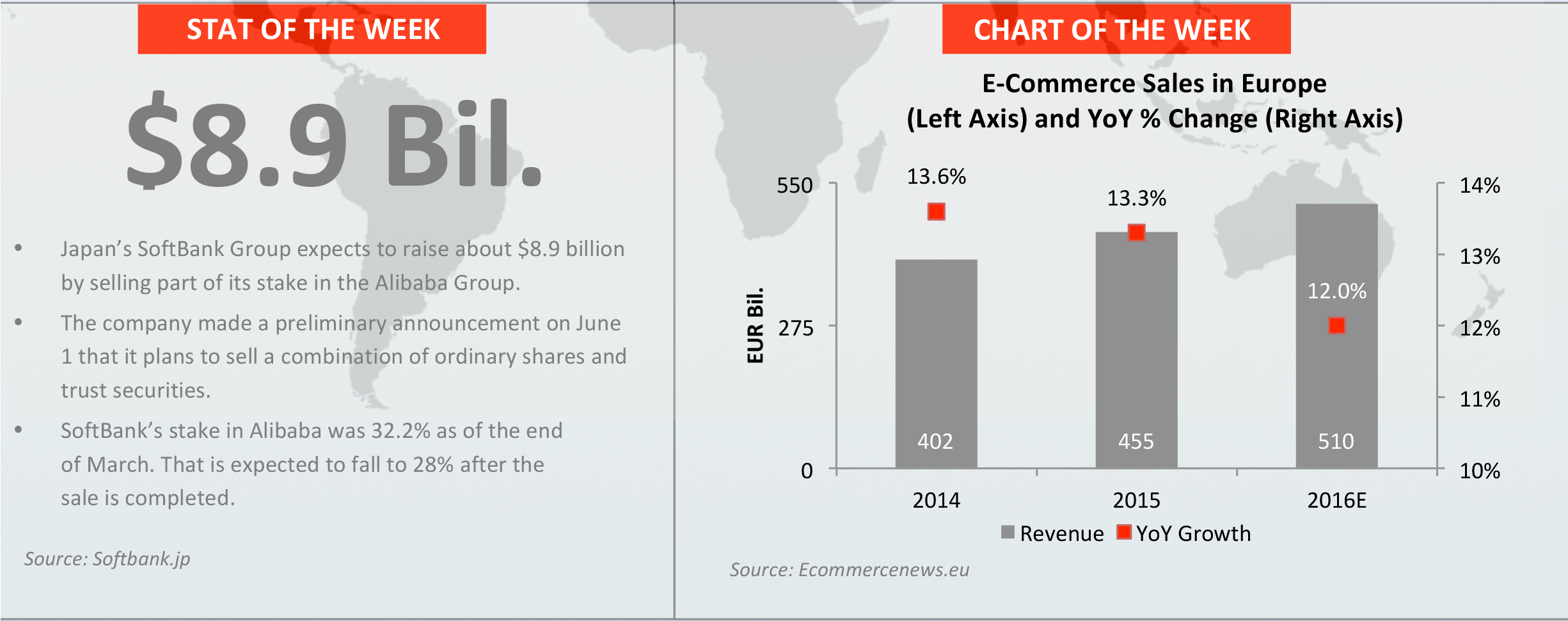
FROM THE DESK OF DEBORAH WEINSWIG
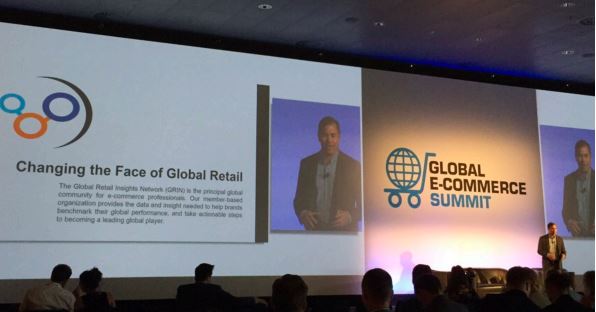
This week, the Fung Global Retail & Technology team attended the ninth annual Global E-Commerce Summit, which has been held in Barcelona for the past six years. The event centers on trends and developments in global e-commerce, cross-border trading and omni-channel retail, and features keynote addresses, presentations on business cases and strategies, networking opportunities and an awards ceremony.
On day one of the conference, we attended presentations on Amazon’s online share gains and how to win in an omni-channel world, as well as talks by executives at LEGO, Zoot, Vestiaire Collective and the E-Commerce Foundation. Amazon’s share of total US retail sales increased from more than 20% in 2012 to more than one-third in 2015, according to Stefany Zaroban, Director of Research at Internet Retailer. Zaroban said this was largely due to the much higher conversion rates of the company’s Prime subscribers (74% versus 13% for non-Prime members). Amazon’s success has led other retailers to follow its lead in terms of offering delivery services such as click-and-collect.
Jorij Abraham from the E-Commerce Foundation took a mathematical approach to defining retail success, expressing it as a function of six variables: size, quality, own versus other brands, service, being a pure player and leadership. Abraham used this formula to refute several retailing myths; he said that price positioning is not related to sales growth, that offline retailers tend to outperform on sales growth and profitability, and that retailers selling their own brands tend to have higher profitability.
The main theme on day two of the event was cross-border e-commerce, which is expected to more than triple, to US$994 billion, from 2015 to 2020, according to Jesse Weltevreden, Professor of E-Business at Amsterdam University. Weltevreden presented some key findings from his study of more than 67,500 European-housed websites: less than 30% of total site visitors were cross-border shoppers and 97% of the sites lacked local websites or pages for foreign shoppers. Still, more than 60% of European web shops studied do sell to foreign customers, he said, and services such as language translation and the acceptance of other currencies help ease the buying process.
Another session centered on the success of online marketplaces in attracting cross-border shoppers. Cheng Ouyang, Executive Senior Advisor at Alibaba Group, outlined his company’s hopes that Chinese shoppers would do more cross-border shopping on Alibaba sites, rather than shopping while on vacation in foreign countries, which is currently a popular option for purchasing international brands. To meet Chinese consumers’ demand for foreign products, Alibaba launched Tmall Global in 2014, and there are currently 5,400 foreign brands represented on the site, including Mars and Nestlé, as well as products from Costco and Macy’s.
Later in the day, Matthew Cannon, Co-Founder of the Global Retail Insights Network, outlined three fundamentals for localizing e-commerce offerings. First, companies must create local “super heroes” that provide local knowledge that the companies need to succeed. Second, they must provide dedicated “tribes” that focus on the customer experience and business in each region. And third, they must hire experienced in-country managers to localize their offerings fully. Cannon also stressed that retailers must make decisions based on validated data, rather than on assumptions. A strategy that succeeds in one country or market is not necessarily applicable to another, nor will it necessarily succeed there. Many large retailers have learned this lesson the hard way, Cannon noted, but retailers have significant opportunities to tap major growth in cross-border e-commerce, and there are many new channels and tools available to assist them in this endeavor.
We found the Global E-Commerce Summit interesting and informative, and we look forward to attending and reporting from future European and global retail industry events.

US RETAIL EARNINGS

Source: Company reports
US RETAIL & TECH HEADLINES
 In the Secondary Sneaker Market, It’s No Longer Just About Nike
(May 31) Racked
In the Secondary Sneaker Market, It’s No Longer Just About Nike
(May 31) Racked
- As sneakerheads continue to line up for hours for the latest sneaker release, footwear companies are racing to insert themselves into sneaker culture. Nike has dominated the secondary market to date, but other brands are starting to catch up, including Adidas, Saucony, New Balance and Asics. Under Armour is the wild card, given the success of its collaboration with NBA star Steph Curry.
- Players in the market are wondering whether smaller brands are beginning to reach their saturation point; as the number of releases multiplies, it is questionable if they will be able to break through in a meaningful way.
 Instagram Gives Retailers New Analytics Tools
(May 31) Internet Retailer
Instagram Gives Retailers New Analytics Tools
(May 31) Internet Retailer
- Facebook-owned Instagram launched Instagram Business Tools, giving retailers and other businesses a better way to understand user data and interact with users. One key feature makes it easier to turn a post into an ad.
- These new tools are available only for business accounts. Additional features allow businesses to get information on how many users saw a particular post, how many click-throughs a post generated and how many users have seen the brand’s posts during the past month.
 Rate of Consumer Spending Enjoys Its Largest Monthly Jump in Six Years
(May 31) The Washington Post
Rate of Consumer Spending Enjoys Its Largest Monthly Jump in Six Years
(May 31) The Washington Post
- In April, consumer spending saw its largest month-over-month increase in six years, rising by 1% after being flat in March. Purchases of autos and other durable goods led the jump in spending.
- Consumer spending accounts for 70% of economic activity, so the increase was seen as a positive sign that the economy is performing notably better. The April figure was the biggest monthly gain since August 2009’s 1.3% increase. The growth reflected a 0.4% gain in incomes and a 0.5% gain in wages.
 Transportation Technology Will Be the Next Internet Protocol
(May 31) TechCrunch
Transportation Technology Will Be the Next Internet Protocol
(May 31) TechCrunch
- People own approximately 1.2 billion cars globally—and 253 million in the US alone—but personal vehicle ownership is incredibly inefficient, as it is estimated that cars are parked 95% of the time.
- As the global population continues to grow and people increasingly choose to live in cities, traffic and logistics will demand more transportation infrastructure. Connected and autonomous vehicles may offer the best solution to optimize roadway and resource utilization, as many jurisdictions do not have the funding or space to invest in infrastructure.
EUROPE RETAIL EARNINGS

EUROPE RETAIL HEADLINES
 Fashion Retailers Hit by Growing Cost of Returns
(May 31) Bbc.co.uk
Fashion Retailers Hit by Growing Cost of Returns
(May 31) Bbc.co.uk
- Research by retail marketing agency Savvy Marketing has revealed that about 56% of UK online fashion shoppers have returned one or more items in the last six months. The cost of returns for retailers is growing as people increasingly turn to e-commerce for their purchases.
- As free returns are an important element of e-commerce, some retailers have resorted to increasing prices to recover these rising costs. The research also found that shoppers aged 18 to 24 were twice as likely as their parents to shop online on their smartphones.
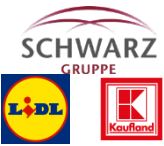 Lidl Reports Revenue Growth of 9% in FY16
(May 27) Retailanalysis.igd.com
Lidl Reports Revenue Growth of 9% in FY16
(May 27) Retailanalysis.igd.com
- German supermarket chain Lidl reported that FY16 revenue grew by 9%, to €64.4 billion (US$71.1 billion). Revenue at Schwarz Group, Lidl’s parent company, grew by 7%, to €85.7 billion (US$94.6 billion), while its hypermarket chain, Kaufland, grew revenue by 4%, to €21.1 billion (US$23.2 billion).
- Austria, Spain and the Czech Republic were among the group’s best-performing markets. Over the coming fiscal year, Lidl intends to invest in new store openings and to launch its first stores in Lithuania in June 2016. Kaufland has implemented a five-year program to remodel all of its 650 stores in Germany according to a new concept.
 Aldi Opens Pop-Up Store in London
(May 27) Retaildetail.eu
Aldi Opens Pop-Up Store in London
(May 27) Retaildetail.eu
- German retailer Aldi has opened a pop-up store called #AldiWine in London’s Shoreditch neighborhood, offering a selection of its best wines. Customers are assisted by a sommelier and can sample some of the wines in-store before placing their order on a tablet and having their wine delivered to their home.
- The store is intended to be a pilot project, to introduce Aldi’s selection of wines to London shoppers.
 Debenhams Hires New CEO From Amazon
(May 26) Company press release
Debenhams Hires New CEO From Amazon
(May 26) Company press release
- British department store chain Debenhams announced that it has appointed Sergio Bucher as CEO. Bucher will take on the role in October this year; the current CEO, Michael Sharp, will step down on June 24.
- Bucher is Vice President of Amazon’s European fashion division and brings with him extensive retail experience from his previous roles at Puma, Nike and Inditex.
 Adidas Set to Begin Production at New Factory in Germany
(May 25) Wgsn.com
Adidas Set to Begin Production at New Factory in Germany
(May 25) Wgsn.com
- In a move to bring manufacturing back to its home market, sportswear producer and retailer Adidas has unveiled a robot-run factory in Ansbach, Germany. The high-tech unit is called Speedfactory, and is equipped to turn customized production into an automated process. The company plans to open a similar factory in the US in 2017.
- Adidas stated that the goal of Speedfactory was not “full automation” and that it has no plans to immediately replace its workers. The company stopped manufacturing shoes in Germany more than two decades ago in favor of lower-cost production in Asia, where it employs about a million people.
ASIA TECH HEADLINES
 “Uber for Deliveries” Startup Lalamove Grabs US$10 Million in Funding
(May 31) TechinAsia
“Uber for Deliveries” Startup Lalamove Grabs US$10 Million in Funding
(May 31) TechinAsia
- The startup with three names—Lalamove, EasyVan and Huolala—announced a fresh, US$10 million round of venture capital funding nine months after securing the same amount in its series A funding.
- The startup recently got some big-name clients, including Google and IKEA. Its service covers Hong Kong, Singapore, Bangkok, Taipei and 15 cities across Mainland China. The service relies on 50,000 van drivers and motorbike couriers, who are all independent contractors.
 As Japan Seeks More Foreign Students, ST Booking Has Raised US$200,000 to Facilitate the Process
(May 30) e27.co
As Japan Seeks More Foreign Students, ST Booking Has Raised US$200,000 to Facilitate the Process
(May 30) e27.co
- In 2008, the Japanese government launched a “300,000 foreign students” plan in an effort to more than double the number of exchange students in the country by 2020. Now, a Tokyo- and Taipei-based startup named ST Booking that is looking to help facilitate the process has secured a US$200,000 seed round from Singapore’s Beenext.
- Currently, the firm has 1,100 education agents on its platform in Taiwan, Thailand and Vietnam, and its Founder and CEO, Shota Morikawa, said the company will expand to Indonesia, Myanmar, Cambodia and Nepal.
 Massive Chinese Buy-Up Is Bringing Bitcoin to a Two-Year High
(May 30) TechinAsia
Massive Chinese Buy-Up Is Bringing Bitcoin to a Two-Year High
(May 30) TechinAsia
- Bitcoin prices have been rising briskly for a week, reaching a two-year high thanks to Chinese buyers. In just one 24-hour period, Chinese consumers bought 1.6 million bitcoins, worth nearly US$850 million.
- This buying frenzy comes at a time when China’s yuan has reached a five-year low against the US dollar. The weaker the yuan, the more people there are looking to get their money out of China. China has tried to limit currency outflows, which were estimated to hit US$1 trillion last year, but currently has no control over bitcoin.
 China’s Wallet Apps Require Real-Name Registration by July 1…or Else
(May 30) TechinAsia
China’s Wallet Apps Require Real-Name Registration by July 1…or Else
(May 30) TechinAsia
- China required real-name registration for mobile phone numbers years ago, then extended the requirement to Weibo and e-commerce. Now, it will be required for the country’s top
e-payment systems, too. Both Alibaba’s Alipay and Tencent’s WeChat Pay have announced that users of accounts not bound to a real identity will face limited access to their funds beginning on July 1.
- Chinese netizens get used to restrictions from the government, but many have concerns that their personal information will not be secured, as they doubt some companies’ ability to protect their identity from fraudsters.
 Japanese Handmade Marketplace Creema Raises US$10 Million
(May 27) TechCrunch
Japanese Handmade Marketplace Creema Raises US$10 Million
(May 27) TechCrunch
- Creema is the latest handmade marketplace in Asia to raise new funding. The Japanese startup announced that it had received ¥1 billion (about US$10 million) from Globis Capital Partners and returning investor KDDI Open Innovation Fund (the venture fund run by Japanese telecom KDDI).
- Creema CEO Kotaro Marubayashi claims that the platform currently has over 2.4 million listings from 60,000 sellers.
LATAM RETAIL HEADLINES
 Chilean Retail Sales Jump 7.9% on Early Onset of Winter
(May 30) Bloomberg
Chilean Retail Sales Jump 7.9% on Early Onset of Winter
(May 30) Bloomberg
- In April, Chilean retail sales rose by 7.9% year over year, the fastest rate of growth seen in 2.5 years and far above the forecasted 4.5%. Early rain and cold weather encouraged consumers to shop for winter clothing earlier this year than they did last year.
- April unemployment in Chile was 6.3%, up 0.4% from the previous month, so the growth in retail is not expected to last.
 Honduras Aims to Invest US$3.4 Billion to Boost Apparel Sector
(May 28) WWD.com
Honduras Aims to Invest US$3.4 Billion to Boost Apparel Sector
(May 28) WWD.com
- Honduras plans to invest US$3.4 billion in order to double its apparel exports, production and employment by 2020, in order to develop in the same manner as its neighbors Nicaragua and Guatemala have. The Honduran government hired McKinsey & Company to find new growth opportunities.
- The investment will boost exports to US$7.4 billion, and move Honduras from its position as the seventh-largest clothing supplier to the US to the fifth largest. If successful, the plan will generate 200,000 new jobs in five years.
 Cuervo Said to Eye Third Quarter for Possible US$1 Billion IPO
(May 31) Bloomberg
Cuervo Said to Eye Third Quarter for Possible US$1 Billion IPO
(May 31) Bloomberg
- Mexico City-based Jose Cuervo, the world’s largest producer of tequila, is looking to raise as much as US$1 billion in an initial public offering planned for the third quarter of this year. The company is said to be working with units of Morgan Stanley, JPMorgan Chase and Banco Santander.
- Jose Cuervo’s net revenue rose by 28% in 2015, to MXN 14.4 billion (US$782 million), after the company purchased the Bushmills whiskey brand from Diageo.
 Coca-Cola Company and Coca-Cola FEMSA to Acquire AdeS from Unilever
(June 1) Market Wired
Coca-Cola Company and Coca-Cola FEMSA to Acquire AdeS from Unilever
(June 1) Market Wired
- The Coca-Cola Company, together with Coca-Cola FEMSA, announced that it has entered into an agreement to acquire Unilever’s AdeS soy-based beverage business for an aggregate amount of US$575 million.
- AdeS is the leading soy-based beverage brand in Latin America, with a presence in Brazil, Mexico, Argentina, Uruguay, Paraguay, Bolivia, Chile and Colombia.
 Latin America Is Uber’s Fastest-Growing Region
(May 30) Bloomberg
Latin America Is Uber’s Fastest-Growing Region
(May 30) Bloomberg
- In Latin America, the number of car journeys ordered via the Uber app tripled during the first four months of 2016, making the region the company’s fastest-growing market. A combination of widespread smartphone usage and subpar public transportation has sparked demand.
- Brazil is expected to surpass Mexico to become Latin America’s number one Uber market this year as Brazilians seek supplementary income in response to the recession and as an influx of tourists visit the country in August for the Olympic Games.
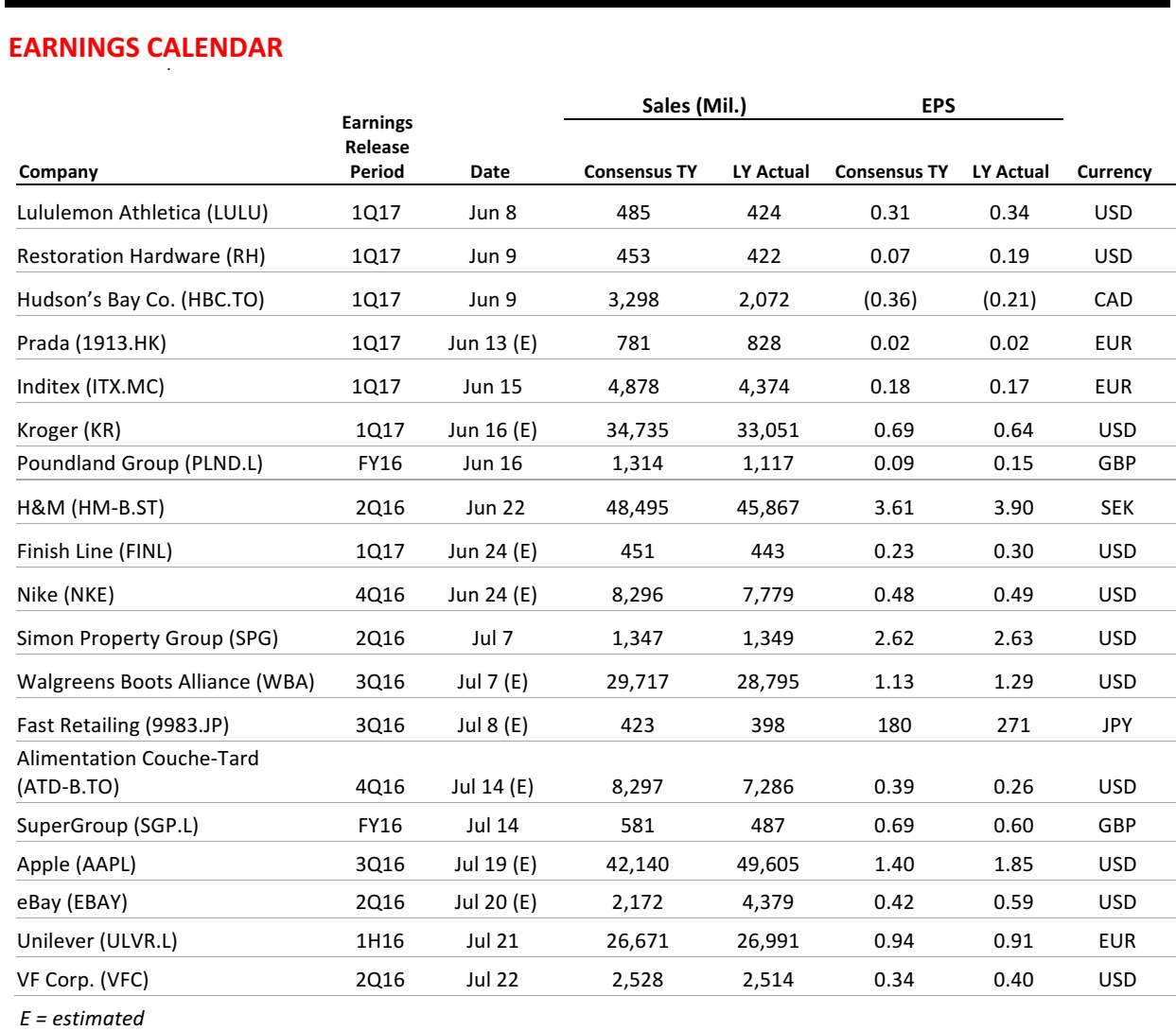
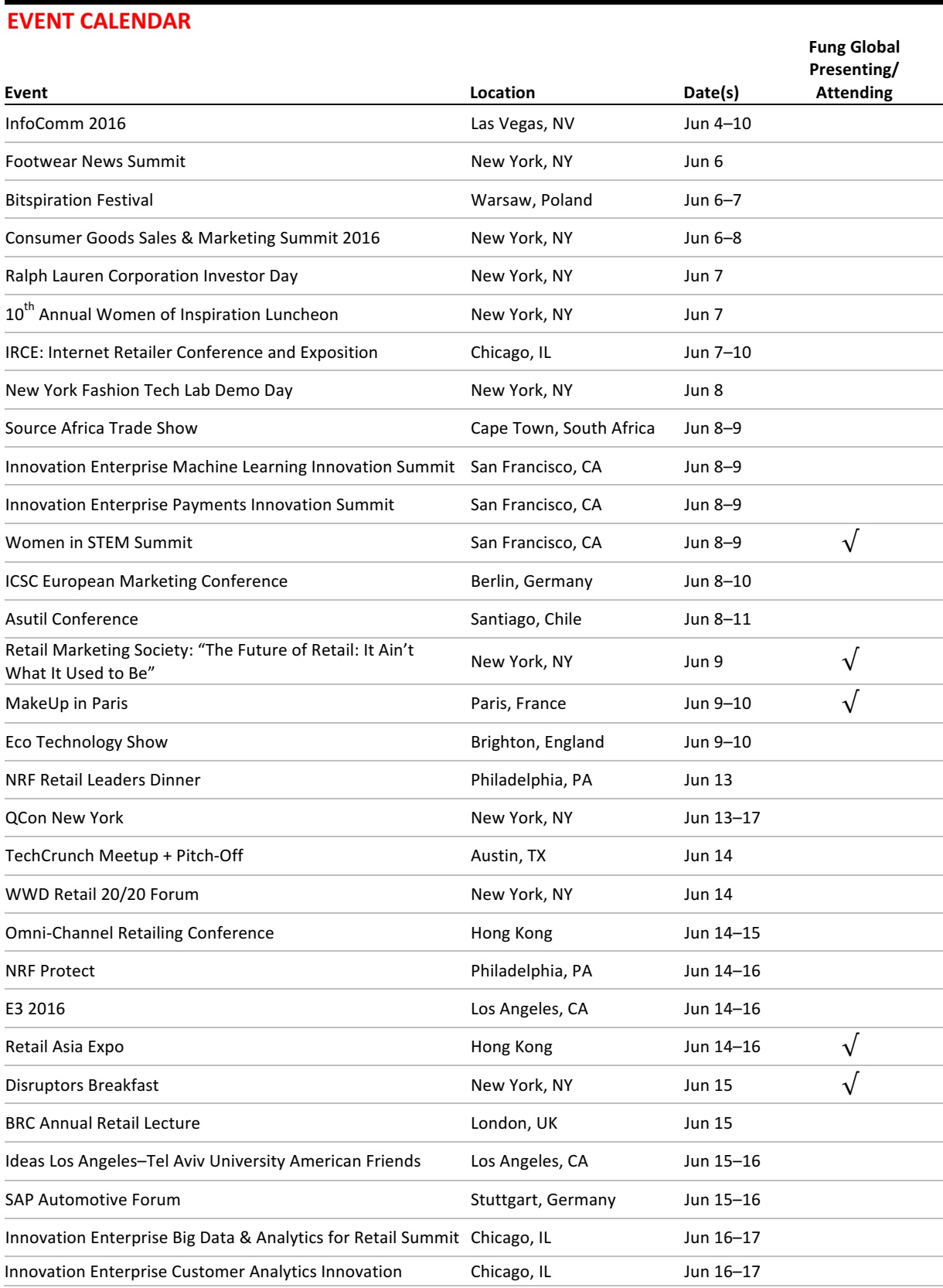


 This week, the Fung Global Retail & Technology team attended the ninth annual Global E-Commerce Summit, which has been held in Barcelona for the past six years. The event centers on trends and developments in global e-commerce, cross-border trading and omni-channel retail, and features keynote addresses, presentations on business cases and strategies, networking opportunities and an awards ceremony.
On day one of the conference, we attended presentations on Amazon’s online share gains and how to win in an omni-channel world, as well as talks by executives at LEGO, Zoot, Vestiaire Collective and the E-Commerce Foundation. Amazon’s share of total US retail sales increased from more than 20% in 2012 to more than one-third in 2015, according to Stefany Zaroban, Director of Research at Internet Retailer. Zaroban said this was largely due to the much higher conversion rates of the company’s Prime subscribers (74% versus 13% for non-Prime members). Amazon’s success has led other retailers to follow its lead in terms of offering delivery services such as click-and-collect.
Jorij Abraham from the E-Commerce Foundation took a mathematical approach to defining retail success, expressing it as a function of six variables: size, quality, own versus other brands, service, being a pure player and leadership. Abraham used this formula to refute several retailing myths; he said that price positioning is not related to sales growth, that offline retailers tend to outperform on sales growth and profitability, and that retailers selling their own brands tend to have higher profitability.
The main theme on day two of the event was cross-border e-commerce, which is expected to more than triple, to US$994 billion, from 2015 to 2020, according to Jesse Weltevreden, Professor of E-Business at Amsterdam University. Weltevreden presented some key findings from his study of more than 67,500 European-housed websites: less than 30% of total site visitors were cross-border shoppers and 97% of the sites lacked local websites or pages for foreign shoppers. Still, more than 60% of European web shops studied do sell to foreign customers, he said, and services such as language translation and the acceptance of other currencies help ease the buying process.
Another session centered on the success of online marketplaces in attracting cross-border shoppers. Cheng Ouyang, Executive Senior Advisor at Alibaba Group, outlined his company’s hopes that Chinese shoppers would do more cross-border shopping on Alibaba sites, rather than shopping while on vacation in foreign countries, which is currently a popular option for purchasing international brands. To meet Chinese consumers’ demand for foreign products, Alibaba launched Tmall Global in 2014, and there are currently 5,400 foreign brands represented on the site, including Mars and Nestlé, as well as products from Costco and Macy’s.
Later in the day, Matthew Cannon, Co-Founder of the Global Retail Insights Network, outlined three fundamentals for localizing e-commerce offerings. First, companies must create local “super heroes” that provide local knowledge that the companies need to succeed. Second, they must provide dedicated “tribes” that focus on the customer experience and business in each region. And third, they must hire experienced in-country managers to localize their offerings fully. Cannon also stressed that retailers must make decisions based on validated data, rather than on assumptions. A strategy that succeeds in one country or market is not necessarily applicable to another, nor will it necessarily succeed there. Many large retailers have learned this lesson the hard way, Cannon noted, but retailers have significant opportunities to tap major growth in cross-border e-commerce, and there are many new channels and tools available to assist them in this endeavor.
We found the Global E-Commerce Summit interesting and informative, and we look forward to attending and reporting from future European and global retail industry events.
This week, the Fung Global Retail & Technology team attended the ninth annual Global E-Commerce Summit, which has been held in Barcelona for the past six years. The event centers on trends and developments in global e-commerce, cross-border trading and omni-channel retail, and features keynote addresses, presentations on business cases and strategies, networking opportunities and an awards ceremony.
On day one of the conference, we attended presentations on Amazon’s online share gains and how to win in an omni-channel world, as well as talks by executives at LEGO, Zoot, Vestiaire Collective and the E-Commerce Foundation. Amazon’s share of total US retail sales increased from more than 20% in 2012 to more than one-third in 2015, according to Stefany Zaroban, Director of Research at Internet Retailer. Zaroban said this was largely due to the much higher conversion rates of the company’s Prime subscribers (74% versus 13% for non-Prime members). Amazon’s success has led other retailers to follow its lead in terms of offering delivery services such as click-and-collect.
Jorij Abraham from the E-Commerce Foundation took a mathematical approach to defining retail success, expressing it as a function of six variables: size, quality, own versus other brands, service, being a pure player and leadership. Abraham used this formula to refute several retailing myths; he said that price positioning is not related to sales growth, that offline retailers tend to outperform on sales growth and profitability, and that retailers selling their own brands tend to have higher profitability.
The main theme on day two of the event was cross-border e-commerce, which is expected to more than triple, to US$994 billion, from 2015 to 2020, according to Jesse Weltevreden, Professor of E-Business at Amsterdam University. Weltevreden presented some key findings from his study of more than 67,500 European-housed websites: less than 30% of total site visitors were cross-border shoppers and 97% of the sites lacked local websites or pages for foreign shoppers. Still, more than 60% of European web shops studied do sell to foreign customers, he said, and services such as language translation and the acceptance of other currencies help ease the buying process.
Another session centered on the success of online marketplaces in attracting cross-border shoppers. Cheng Ouyang, Executive Senior Advisor at Alibaba Group, outlined his company’s hopes that Chinese shoppers would do more cross-border shopping on Alibaba sites, rather than shopping while on vacation in foreign countries, which is currently a popular option for purchasing international brands. To meet Chinese consumers’ demand for foreign products, Alibaba launched Tmall Global in 2014, and there are currently 5,400 foreign brands represented on the site, including Mars and Nestlé, as well as products from Costco and Macy’s.
Later in the day, Matthew Cannon, Co-Founder of the Global Retail Insights Network, outlined three fundamentals for localizing e-commerce offerings. First, companies must create local “super heroes” that provide local knowledge that the companies need to succeed. Second, they must provide dedicated “tribes” that focus on the customer experience and business in each region. And third, they must hire experienced in-country managers to localize their offerings fully. Cannon also stressed that retailers must make decisions based on validated data, rather than on assumptions. A strategy that succeeds in one country or market is not necessarily applicable to another, nor will it necessarily succeed there. Many large retailers have learned this lesson the hard way, Cannon noted, but retailers have significant opportunities to tap major growth in cross-border e-commerce, and there are many new channels and tools available to assist them in this endeavor.
We found the Global E-Commerce Summit interesting and informative, and we look forward to attending and reporting from future European and global retail industry events.


 In the Secondary Sneaker Market, It’s No Longer Just About Nike
(May 31) Racked
In the Secondary Sneaker Market, It’s No Longer Just About Nike
(May 31) Racked

 Lidl Reports Revenue Growth of 9% in FY16
(May 27) Retailanalysis.igd.com
Lidl Reports Revenue Growth of 9% in FY16
(May 27) Retailanalysis.igd.com
 “Uber for Deliveries” Startup Lalamove Grabs US$10 Million in Funding
(May 31) TechinAsia
“Uber for Deliveries” Startup Lalamove Grabs US$10 Million in Funding
(May 31) TechinAsia
 Latin America Is Uber’s Fastest-Growing Region
(May 30) Bloomberg
Latin America Is Uber’s Fastest-Growing Region
(May 30) Bloomberg

